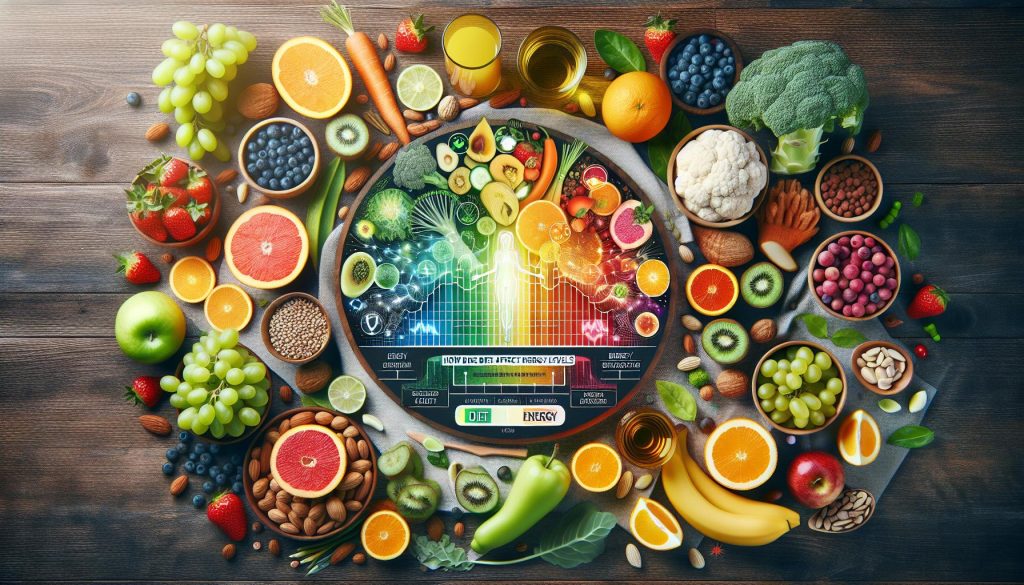
Introduction
What precisely is the influence of our food consumption on our vitality and vigor? How much does our diet affect our energy levels? In essence, our diet and the fuel we feed our bodies plays an abundant role in determining how vivacious and vibrant we can function throughout the day. This article will delve deeper into this topic, focusing on the powerful impact particular foods and nutrients can have on our zest for life, how meal timings can make or break our energy reserves, and shed light on specific dietary methods aiming to aid energy optimization.
The Tantalizing Tale of Food and Fuel
Life essentially is a dance between taking in energy and expending it. Food serves as the vital foundation on which the rhythm and pace of this dance are determined. The simple symphony of carbohydrates, proteins, and fats form the essential macronutrients that our body converts into energy, with each playing a singular role in the energy production saga.
The Macronutrient Medley
Carbohydrates, often vilified in the contemporary diet scenario, are ironically the body’s primary energy source. Consider them the unassuming yet vital crew members hustling behind the grand show of life. Proteins, the body’s building blocks, also contribute to energy levels but primarily focus on repair and growth. Fats, the oft-misunderstood, yet richly rewarding component of our dietary intake, offer the highest energy concentration, making them the marathon runners of energy sustenance.
The Timing of Tastes
Just gorging on all these amazing macronutrients isn’t enough for sustained pep though. Timing plays a pivotal part too, like the conductor of an orchestra, ensuring all players hit their notes harmoniously. This becomes strikingly apparent when we think about the age-old practice of breakfast consumption.
A Paean to the Power of Breakfast
Ever wondered why breakfast is considered the most important meal of the day? Breaking the overnight fast with a nutrient-dense breakfast acts like jump-starting your car on a frosty winter morning. It not only replenishes depleted energy stores but sets your body’s metabolic pace for the day ahead.
Dietary Approaches Aimed at Energy Optimization
Can our dietary regimen also contribute to improved energy levels? From the famed Mediterranean diet to the increasingly popular Alkaline Diet, certain dietary methodologies claim to elevate energy levels by emphasizing on certain food types and eschewing others.
Embracing the Alkaline Ambiance
Alkaline diet enthusiasts assert that a diet rich in alkaline foods i.e., fruits, veggies, nuts, and seeds, while reducing the intake of acid-forming foods, like dairy, grains, meats, and processed foods, helps in maintaining the body’s pH balance, resulting in better energy levels, amongst other health benefits.
Conclusion
Ultimately, the mysterious interplay between diet and energy levels is like the intricate yet harmonious notes of a symphony. A well-balanced diet, timely consumption, aided by an awareness of one’s unique physiological responses can aid in hitting the energetic high notes of life’s melody. lt’s not just about what you eat, but also when and how you eat; every aspect blends together to create the wholesome song of vitality and vigor.
Frequently Asked Questions
1. Can certain foods increase your energy levels?
Yes, certain foods, especially those rich in complex carbohydrates, proteins, and healthy fats can provide sustained energy.
2. Can skipping breakfast affect your energy levels?
Skipping breakfast can lead to an energy slump, as it’s essential to refuel and kickstart your metabolism in the morning.
3. How can the Alkaline diet boost energy?
The Alkaline diet proponents believe consuming alkaline foods helps in maintaining body’s pH balance, leading to improved energy levels.
4. Can late-night eating affect energy levels?
Late-night eating, especially heavy meals, can disrupt sleep patterns and subsequently affect overall energy levels.
5. Can drinking water improve energy levels?
Yes, even mild dehydration can cause fatigue, so drinking ample water helps in maintaining energy levels.



